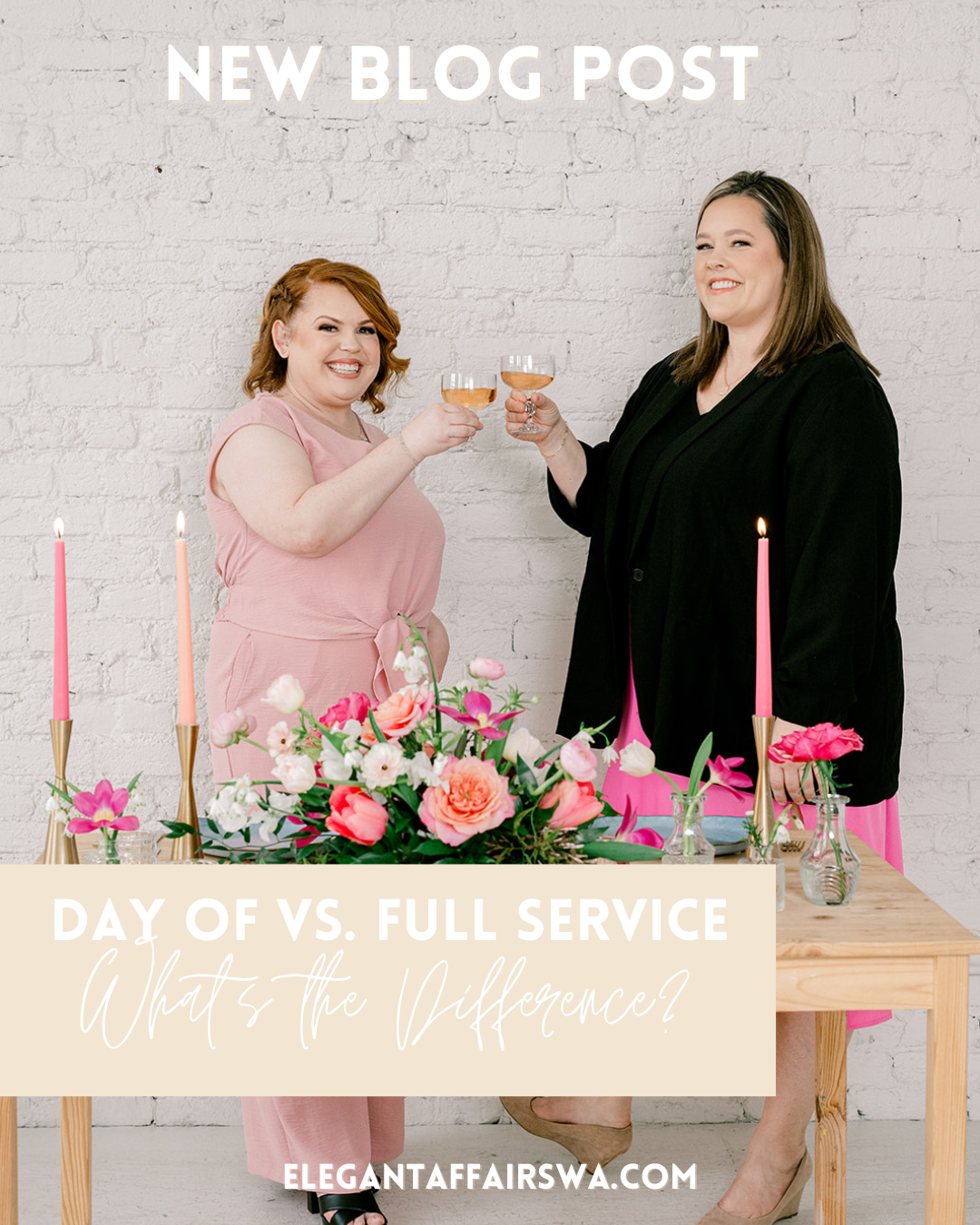When you start planning a wedding, one of the first pieces of advice you’ll hear is: “Hire a wedding planner—it’ll save you time and stress.” But, as the industry has grown, the terms of day-of-coordinator and full-service wedding planner get used interchangeably. But, as we offer both at Elegant Affairs, we can tell you that they refer to very different roles. Many couples aren’t sure where to start, or do not know that not all wedding planning services or packages are the same. So, let’s break down the differences between a day-of coordinator and a full-service planner, so you can decide which option makes the most sense for your big day.
So what is a day-of coordinator?
A day-of typically doesn’t just show up at your event and it’s the first time you’ve communicated. In most cases, you’ve been working with your coordinator for 6 weeks, or so, prior to the wedding. A day-of coordinator comes in once all the details are planned. Their sole purpose is not to create the plans or the details, but to execute the plans you've already made. They basically make it happen, but not plan it. Some of the typical responsibilities that we’ve seen in the industry are:
Reviewing your wedding timeline and floor plan
Confirming logistics with your vendors
Overseeing the ceremony and reception set up
Timeline creation
Serving as the point of contact on the day of
Ensuring that the venue is closed down at the end of the night
Making sure everyone and everything is where they need to be on the day of.
Think of a day-of coordinator like a stage director at a play. They aren’t the director (that’s you), they don’t do the casting, or set the design. They make sure the actors are where they need to be and everything rolls out at the scene change appropriately. They make sure everything is smooth and pulls together. And that readers just want they do.
Now, what does a Full-Service Wedding Planner do?
Some companies prefer to offer just day-of services. Many companies, including us, offer a wide variety of services, which include a full-service wedding package. This package or person is your complete guide, creative partner, and project manager from the day of hire, to finish. Typically couples select this package if they are just starting out the planning process. Full-Service planners support everything from budget creation, to getting in touch with vendors in the exploratory stages. The typical responsibilities of this position or package are:
Finding vendors that fit your vision and budget
Attending vendor meetings
Creating or managing your budget
Helping or reviewing vendor contracts
Supporting the guest list
Designing the overall theme
Attending vendor meetings and tastings
Creating timelines
Creating floor plans
Coordinating logistics on the wedding day
Coordinating the clean-up
This type of planner is perfect for couples who are busy, planning a large or complex event, or simply want a stress-free experience from day one. They bring both big-picture vision and on-the-ground execution.
So, what is best for the US?
There are a few things you’ll need to consider before selecting which option is best for you. If you want someone to be with you from start to finish and provide extensive support, the full-service planner is for you. If you are the Pinterest and logistics queen that needs minimal planning help, then we recommend a day-of-coordinator to support the execution. If you plan on booking all your vendors, stick with the day-of, whereas if you need support with the research, vetting vendors, and booking (to include overlooking contracts) move towards hiring the full-service planner. But, most importantly, they will both help with the day of execution.
As you consider, think about what fits in your budget and which option will give you more piece of mind on your wedding day. It’s important to think about your stress levels, needs, and level of input and decision making you’d like to have. And if you’re not sure, or you’re in between, many companies offer partial planning. This is perfect for the couples that just aren’t sure where they land. Or they need a little bit of planning support, as well as the execution on the day of. This might include help finding vendors, some design input, and monthly check-ins. If you want support with certain aspects but not the whole event, this hybrid approach can be ideal.
If there’s one thing most of our past couples agree on, it’s this: hire someone to coordinate your day. Even if you’ve planned every detail yourself, you don’t want to be the one checking on table layouts or chasing down the DJ for your first dance. A trusted coordinator frees you up to be fully present—and enjoy every minute. So, whether you go full-service or just need someone to handle the final stretch, hiring the right help ensures your wedding feels polished, peaceful, and exactly how you imagined.
At the end of the day your wedding should feel FUN and be filled with JOY—not like a second job. The right planner or coordinator helps make that possible.
Lori Losee is the owner of Elegant Affairs, a Tacoma Wedding Planner with over 19 years of experience. We create awe-inspiring experiences—Events filled with meaning and refined elegance. Behind the scenes, our experienced team collaborates on each stage of the process, executing your vision and a wedding, celebration, or corporate event that is unique to you.



